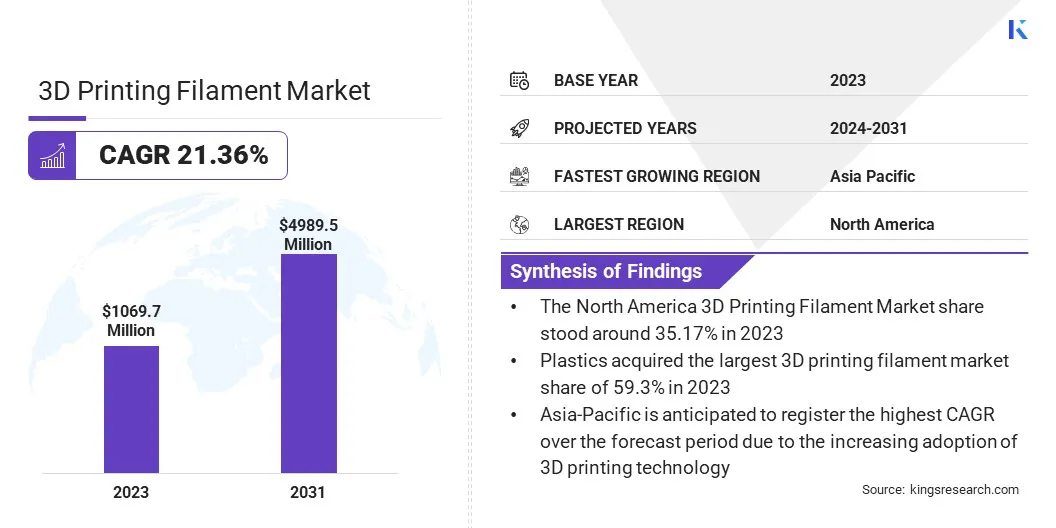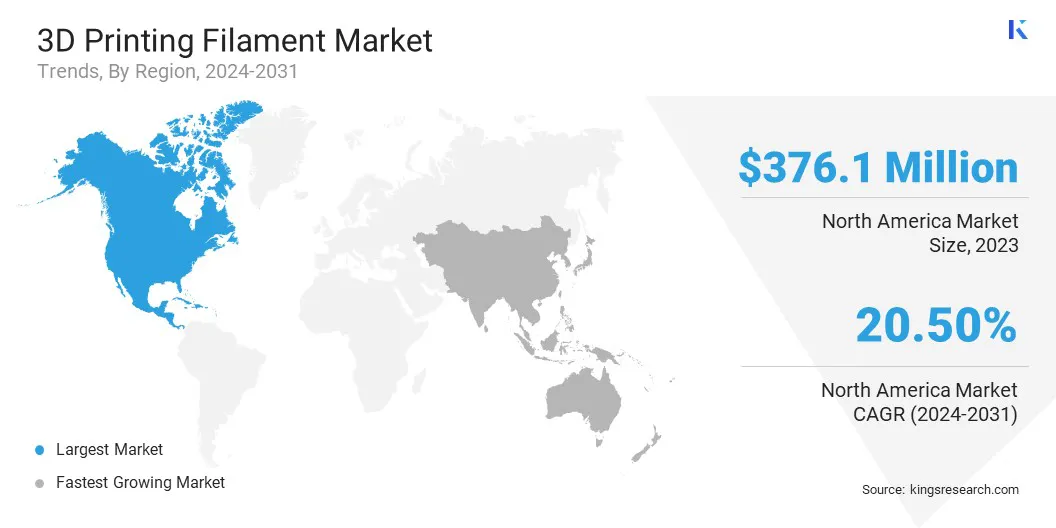3D Printing Filament Market Size
The global 3D Printing Filament Market size was valued at USD 1,069.7 million in 2023 and is projected to reach USD 4,989.5 million by 2031, growing at a CAGR of 21.36% from 2024 to 2031. In the scope of work, the report includes products offered by companies such as Höganäs AB, 3D Systems Corporation, General Electric, Arkema S.A, Royal DSM N.V, Stratasys, Ltd., Evonik Industries AG, ExOne, Arcam AB and Others.
The 3D printing filament market is experiencing robust growth, propelled by the escalating demand for bespoke and intricate products across multiple sectors. A pivotal factor driving this expansion is the ongoing advancements in 3D printing technology, which have led to the emergence of a broad spectrum of filaments boasting varied properties.
Moreover, the increasing integration of 3D printing within industries such as aerospace, automotive, healthcare, and consumer goods is amplifying the need for premium filaments tailored to meet precise industry specifications. This trend has spurred manufacturers to innovate and launch novel materials, including flexible, conductive, and composite filaments, to address the dynamic demands of their clientele.
Additionally, the superior capabilities of 3D printing technology enable the fabrication of detailed and complex designs. Consequently, various industries are now equipped to manufacture prototypes, components, and end-products with enhanced accuracy and efficiency.
Consequently, with the ongoing progression in 3D printing technologies and the introduction of novel filament materials, the range of applications and benefits provided by this advanced manufacturing method is expected to expand significantly in the upcoming period.

Analyst’s Review
The 3D printing filament market is experiencing significant growth, driven by the increasing adoption of 3D printing technology across various industries. With more companies and individuals recognizing the benefits of utilizing 3D printing for prototyping, production, and customization purposes, the market is set to grow further.
Additionally, the availability of a wide range of materials, colors, and properties in 3D printing filaments is attracting a diverse user base, ranging from hobbyists to professionals. As technology advances and becomes more accessible, product uptake is slated to rise. Moreover, companies are actively investing in research and development to develop new filaments that can meet the specific requirements of various industries and applications.
Market Definition
3D printing filaments refer to the materials used in additive manufacturing processes to create three-dimensional objects. These filaments are typically made from thermoplastic polymers such as ABS, PLA, and PETG, as well as more specialized materials like nylon and carbon fiber.
The market for 3D printing filaments encompasses manufacturers, suppliers, and end-users involved in the production and consumption of these materials for various applications across industries such as aerospace, automotive, healthcare, and consumer goods. As technology advances, new materials with unique properties are constantly being developed to cater to specific industry needs.
- For instance, conductive filaments are used in electronics manufacturing, while flexible filaments are popular in the production of wearables and prosthetics.
The demand for 3D printing filaments is expected to continue growing as more industries recognize the benefits of additive manufacturing in terms of cost-effectiveness and customization. With ongoing research and development, the market for 3D printing filaments is poised for further expansion and innovation in the coming years.
3D Printing Filament Market Dynamics
The growth of the 3D printing filament market has been driven by the increasing demand for customized products and rapid prototyping across various industries. Advancements in technology, including the development of new materials and improved printing techniques, have allowed manufacturers to produce high-quality filaments with enhanced performance and durability.
The adoption of 3D printing in sectors such as healthcare, automotive, and aerospace has further fueled the market for filaments. These industries are leveraging the advantages of 3D printing filaments to manufacture intricate parts and components with precision and efficiency, contributing to the overall market growth.
Additionally, the customization options provided by 3D printing filaments have attracted a broader range of industries, including fashion and architecture, to incorporate this technology into their production processes.
As more businesses recognize the cost-saving benefits and design flexibility offered by 3D printing filaments, the demand for these products is expected to continue increasing. Thus, the 3D printing filament market is anticipated to grow rapidly with ongoing innovations and expanding applications driving its growth.
However, escalating material expenses have significantly affected the 3D printing filament sector, leading to production and distribution hurdles. Manufacturers are facing difficulties in preserving competitive pricing due to heightened costs associated with procuring raw materials, which is hampering industry growth.
Moreover, elevated material costs have compelled some enterprises to scale back their research and development initiatives, impeding the launch of innovative and sophisticated filament products into the market, which is negatively impacting the product landscape.
Segmentation Analysis
The global market is segmented based on type, end user, and geography.
By Type
Based on type, the market is bifurcated into plastics, metals, ceramics, and others. Plastics acquired the largest 3D printing filament market share of 59.3% in 2023, due to its versatility and affordability. With a wide range of plastic materials available, including ABS, PLA, and PETG, users have the flexibility to choose the best option for their specific needs.
Additionally, plastic filaments are easy to work with, which makes them ideal for both beginners and experienced users alike. This accessibility has led to a surge in demand for plastic filaments, driving the overall growth of the market.
By Ingredient
Based on end user, the market is bifurcated into aerospace & defense, medical & dental, automotive, electronics, and others. The aerospace & defense segment has emerged as a dominant segment in the 3D printing filament market, garnering a revenue share of 32.8% in 2023, due to the high demand for lightweight and durable materials. These industries require precise and complex components that can only be attained through advanced 3D printing technology.
Additionally, the ability to rapidly prototype and produce customized parts gives aerospace and defense companies a competitive edge in the market. This sector also benefits from the cost-effectiveness and efficiency of 3D printing, allowing for quicker turnaround times and reduced production costs.
3D Printing Filament Market Regional Analysis
Based on region, the global market is classified into North America, Europe, Asia Pacific, MEA, and Latin America.

The North America 3D Printing Filament Market share stood around 35.17% in 2023 in the global market, with a valuation of USD 376.18 million, primarily on account of the region's substantial concentration of industry-leading entities, including 3D systems, Stratasys, and proto labs. These organizations have solidified their market positions, fostering innovation and stimulating filament demand.
Moreover, North America benefits from an established infrastructure and a sophisticated technological ecosystem that bolsters the 3D printing sector, enabling efficient filament production and distribution and providing North American firms with a market advantage. Additionally, the formidable research and development capabilities available in the region, coupled with a commitment to sustainability, are further cementing the region's leadership in the filament market.
Asia-Pacific is anticipated to register the highest CAGR over the forecast period due to the increasing adoption of 3D printing technology in industries such as manufacturing, automotive, healthcare, and aerospace. These industries are recognizing the benefits of using 3D printing filaments for prototyping, product customization, and cost-effective production.
Additionally, the presence of a large number of 3D printer manufacturers and suppliers in the Asia-Pacific region has contributed to the growth of the market by providing easy access to a variety of high-quality filaments. Furthermore, technological advancements and high supply chain efficiency are rapidly driving the 3D printing filament market growth in the region.
Competitive Landscape
The 3D printing filament market report will provide valuable insights with an emphasis on the fragmented nature of the industry. Prominent players are focusing on several key business strategies, such as partnerships, mergers & acquisitions, product innovations, and joint ventures to expand their product portfolio and increase their respective market shares across different regions.
Expansion & investments are the major strategic initiatives adopted by companies in this sector. Industry players are investing extensively in R&D activities, building new manufacturing facilities, and supply chain optimization.’
List of Key Companies in 3D Printing Filament Market
Key Industry Developments
- August 2022 (Expansion): Nexa3D, an industrial 3D printing solution company, expanded its product portfolio to advance its digital dentistry portfolio by making new expansions and installations for the 3D printing processes for applications in the dental industry.
The Global 3D Printing Filament Market is Segmented as:
By Type
- Plastics
- Metals
- Ceramics
- Others
By End User
- Aerospace & Defense
- Medical & Dental
- Automotive
- Electronics
- Others
By Region
- North America
- Europe
- France
- UK
- Spain
- Germany
- Italy
- Russia
- Rest of Europe
- Asia Pacific
- China
- Japan
- India
- South Korea
- Rest of Asia Pacific
- Middle East & Africa
- GCC
- North Africa
- South Africa
- Rest of Middle East & Africa
- Latin America
- Brazil
- Argentina
- Rest of Latin America


